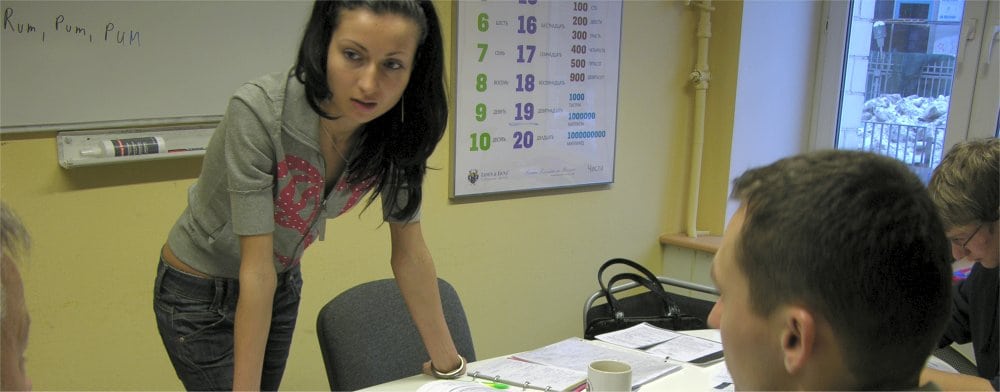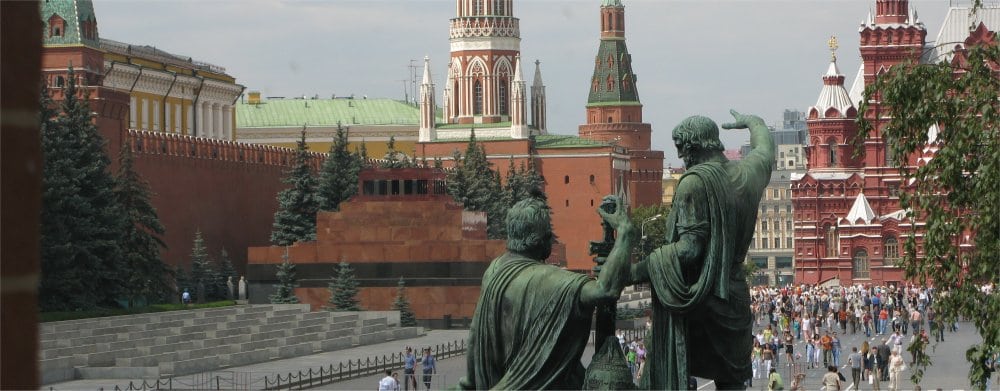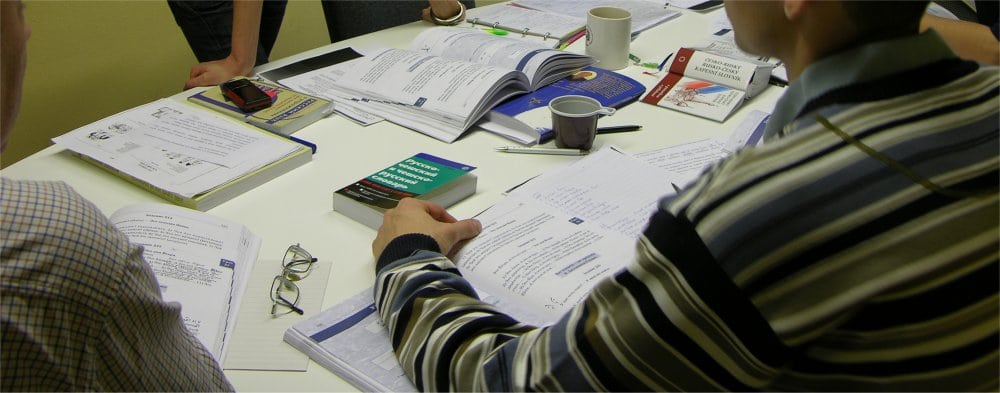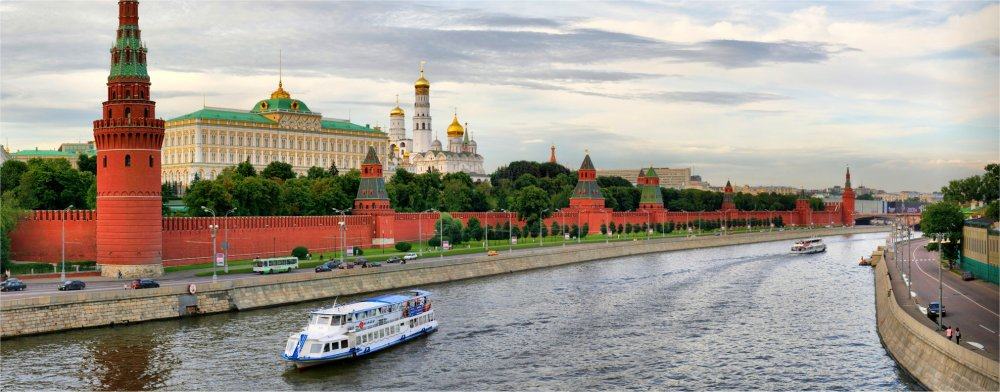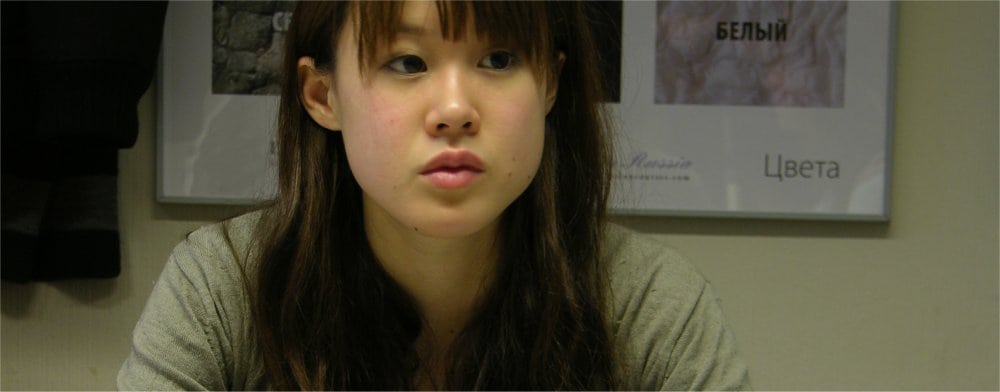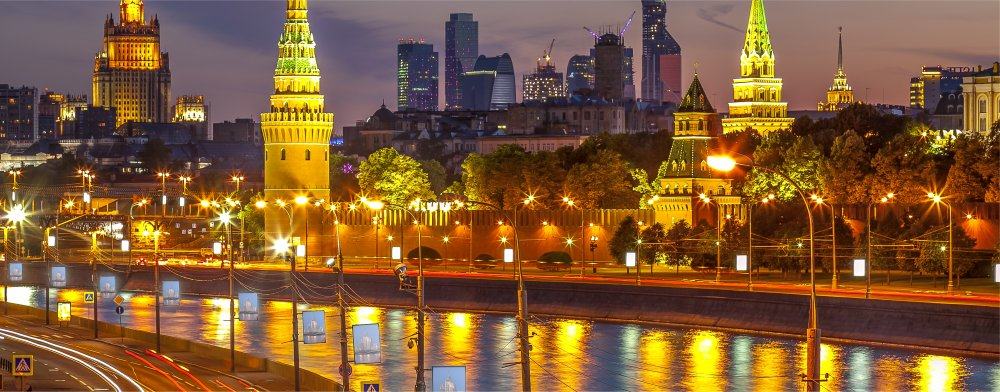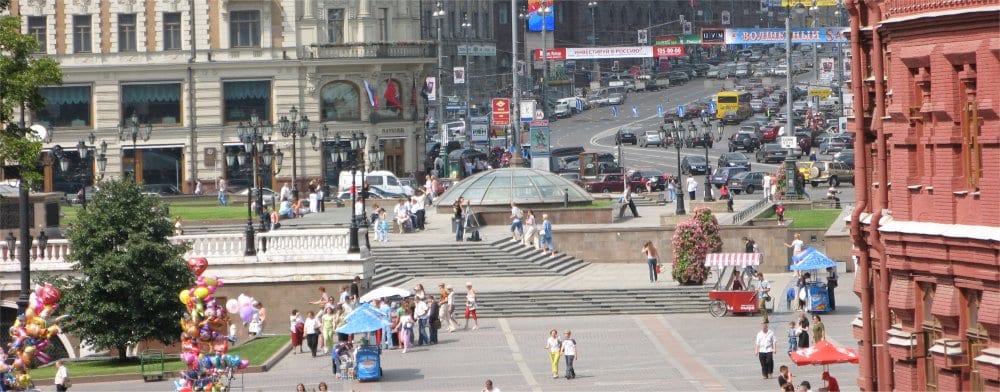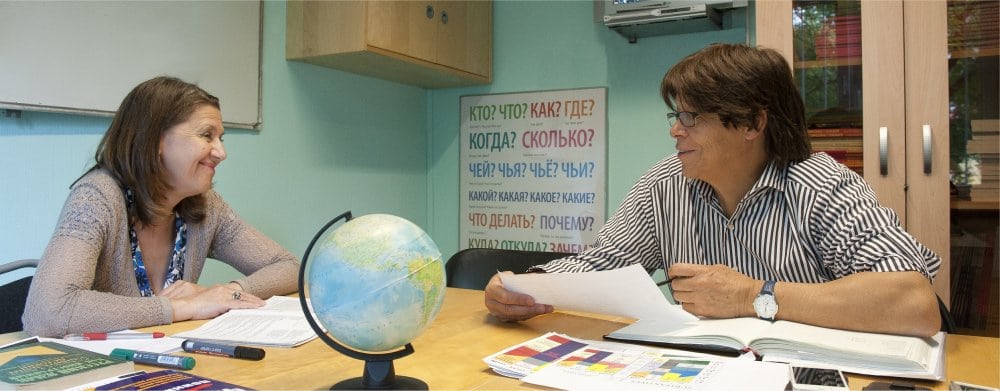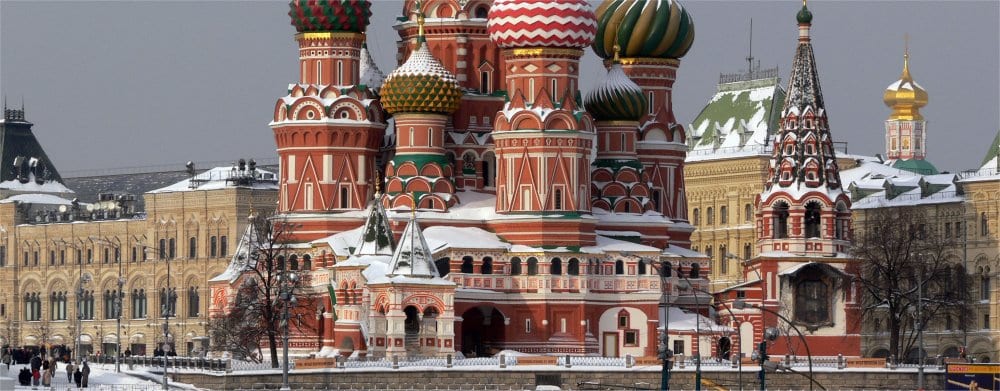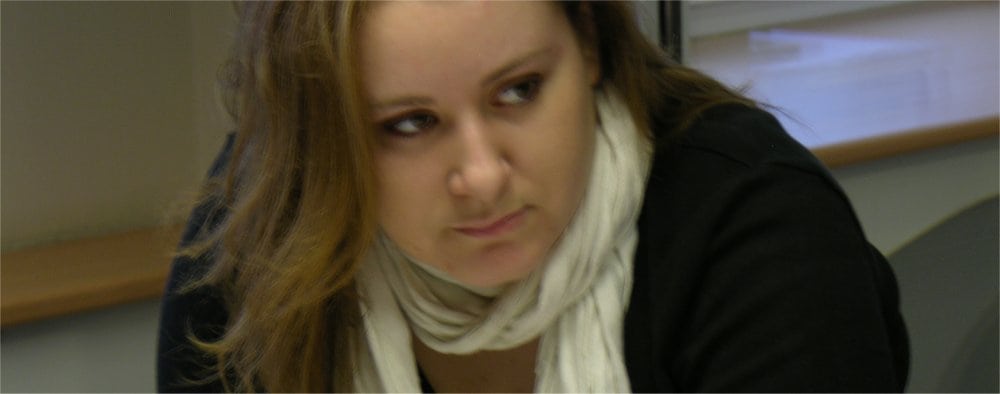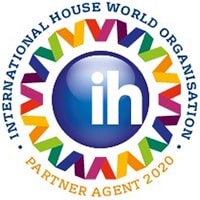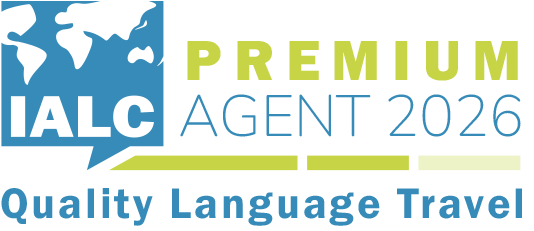Learn Russian in Moscow: Teaching
Teaching Methodology
All Russian courses are based on communicative approaches and combine learning common expressions used in everyday situations with thorough and systematic work on grammar. This is very important for Russian with its developed system of grammar forms with an inflectional system and a non-fixed word order – a language in which word endings or word’s place create the meaning.
Conversational topics are given with appropriate grammar structures, while the grammar part of the course proceeds gradually from simple “basic concepts” to more complex issues in a psychologically proven order (e.g. naming objects – describing locations – actions with objects – moving to and from, etc.). One of the Russian school’s most important principles consists in giving students the linguistic means to express themselves in everyday situations by constant training of communicative skills and models, which allows learners to achieve their own communicative objectives.
For beginners, the Russian school has it’s own course book Poehali, which has been tested and used in the school for several years. During this period feedback from teachers and students has been analysed and many changes have been made. Poehali is a joint project with Zlatoust, a leading publishers in the field of Russian as a Foreign Language.
The language school follows a tried and tested open group system with continuous enrolment and student intake every second week throughout the year (some restrictions for beginners apply). As students arrive from all over the world, groups tend to be very international. This is a perfect occasion to make new friends but it also requires that teaching will be in Russian only with no explanations given in English or any other language.
Group tuition structure
Communicative teaching is provided in small groups (maximum 12 students per group) making this course both pleasurable and linguistically productive. All groups are formed according to a written and oral assessment test compulsory for every student.
Standard Group Courses
Give participants the chance to learn communicative skills in “real life” situations. This course of 20 weekly lessons is offered year round and follows a modular pattern of two-week units. For participants staying four weeks or longer, following modules build upon the grammar basics of the first module, treating the same topics from a different angle with more in-depth explanations, more complex vocabulary, different exercises and more dialogues.
Each course starts on a Monday and ends on a Friday, with lessons taking place usually between 10:00 and 14:00. The minimum course length is two weeks. The maximum course length is open. Our rates are degressive – longer stays are lower priced. Starting dates and prices are here.
Intensive Group Courses
Our intensive group course runs over twenty-five lessons per week in groups with a maximum of twelve participants. You will have twenty morning lessons with students who have booked the standard group course. The remaining five lessons are taught on two afternoons, offered at a minimum of three different levels:
A1 – Beginner: survival Russian tutorials, outdoor classes (shopping, eating out, getting streetwise, ordering theatre and cinema tickets) and telephone training (booking a restaurant table, making flight enquiries, etc.).
A1+/A2 – Elementary: lectures on the Russian mentality and traditions. Other topics cover a wide range of general interest subjects ranging from Russian cuisine to history.
B1 – Intermediate, B2 – Upper Intermediate: the focus is on business and the economy. Other topics include politics, Russian mass media, cultural and historical subjects.
Private Tuition
The language school in St Petersburg has been teaching Russian to the corporate and diplomatic world since 1992 and has acquired a lot of experience across very different industries. Individual classes prior to an assignment to Russia are a very effective way to prepare for an upcoming relocation. One-to-One classes are demanding and require full concentration over a prolonged period of time. Teacher and student jointly determine the exact content of any One-to-One course. The student is invited to specify his/her field of interests by completing a needs analysis form, which allows the staff to pre-select material, establish a study-plan and prepare a specific vocabulary.
One-to-one courses are available in varying degrees of intensity: 15, 20, 30 or 40 lessons per week.
If enrolling for 30 lessons or more the student is taught by a team of two teachers.
Individual courses can be booked throughout the year. The minimum course length is one week with each course starting on a Monday and ending on a Friday. If required and with sufficient notice, lessons can also be held on weekends.
Russian Language Teachers
All of the Moscow school’s teachers are native speakers and hold a university degree either in Teaching Russian as a Foreign Language (RKI) or Linguistics. The school encourages their teachers to learn new languages, because we believe that having this experience as students is a valuable source for further improvement of their own professional skills. The teachers apply a variety of techniques ranging from introduction to the Russian language history, from etymology and comparative linguistics to role-play, live discussions and creative work (drawing, story telling) in the class. Teacher training sessions take place on a regular basis. During team work the Russian teachers can share their experiences, discuss the problems they recently solved, new methods and techniques they have implemented and evaluate new teaching materials.
Russian language levels
In our group courses, we teach six levels of Russian year-round (beginner to intermediate) and eight levels during busy summer period (adding upper-intermediate and advanced classes). For reasons of compatibility, we have adapted the framework of the European Language Portfolio. Lesson numbers in the table below are averaged, based on our experience with students passing through our centres. Students enrolling for a one-to-one course will need less time to pass from one level to the next.
A0 Beginner
Can recognise, read and write simple words and phrases. Can introduce him/herself and others. Can ask and answer questions about personal details (name, age, nationality, profession)
| Lessons 20 (1 week) |
Active vocabulary 50 words or constructions |
Exams offered None |
A1 & A1+ Elementary
Can understand and use familiar everyday expressions and very basic phrases aimed at the satisfaction of needs of a concrete type. Can interact in a simple way provided the other person talks slowly and clearly and is prepared to help.
| Lessons A1 60 (3 weeks) A1+ 100 (5 weeks) |
Active vocabulary 200 words or constructions 600 words or constructions |
Exams offered telc A1 |
A2 High Elementary
Can understand sentences and frequently used expressions related to areas of most immediate relevance (e.g. very basic personal and family information, shopping, local geography, employment). Can describe in simple terms aspects of his/her background, immediate environment and matters in areas of immediate need.
| Lessons A2 100 (5 weeks) A2+ 160 (8 weeks) |
Active vocabulary 1000/1200 words or constructions 1300 – 1500 words or constructions |
Exams offered telc A2 |
Can understand the main points of clear standard input on familiar matters regularly encountered in work, school, leisure, etc. Can deal with most situations likely to arise whilst travelling in an area where the language is spoken. Can describe experiences and events, dreams, hopes & ambitions and briefly give reasons and explanations for opinions and plans.
| Lessons B1 140 (7 weeks) B1+ 100 (5 weeks) |
Active vocabulary 1800 words or constructions 2200 words or constructions |
Exams offered telc B1 |
B2 High Intermediate
Can interact with a degree of fluency and spontaneity that makes regular interaction with native speakers quite possible without strain for either party. Can produce clear, detailed text on a wide range of subjects and explain a viewpoint on a topical issue giving the advantages and disadvantages of various options.
| Lessons B2 2 200 (10 weeks) B2+ 200 (10 weeks) |
Active vocabulary 3500 words or constructions 4500 words or constructions |
Exams offered telc B2/TRKI 2 |
Can express him/herself fluently and spontaneously without much obvious searching for expressions. Can use language flexibly and effectively for social, academic and professional purposes. Can produce clear, well-structured, detailed text on complex subjects, showing controlled use of organisational patterns, connectors and cohesive devices.
| Lessons 160 (8 weeks) |
Active vocabulary 6000 words or constructions |
Exams offered TRKI 3 |
Notes:
1. average number of lessons (each 50 minutes) for a standard group course
2. open group courses not available year round
3. rarely requested level; only taught in one-to-one or closed group classes
In reality a student chooses to attend a short course or a longer “Languages for Life” or Academic Year programme according to their linguistic goals, personal wishes and time constraints.
End of Course Certificates
All students receive a graded certificate (in Russian) at the end of their stay, indicating course type, course dates, numbers of lessons and level achieved. The school place great importance that students attend classes punctually. The school reserves the right to refuse to issue a course certificate to students who persistently arrive late. The teachers expect students to arrive for tuition rested and alert.
Students wishing to take an exam during their stay, may sign up for a telc Russian language test. The exam is closely aligned with the Common European Framework of Reference for Languages (CEFR). The telc Russian language test is available for A1, A2, B1 and B2 language levels. The school teachers are also qualified to prepare for TRKI state exams, to be taken at the university.

